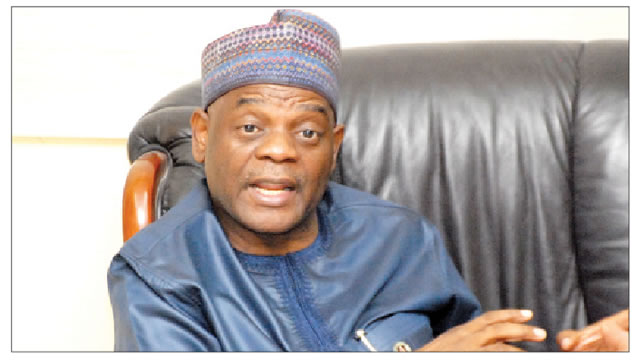TETFund: Echono Moves Against Misapplication of Resources

An “action administrator” is probably how Sonny Togo Echono, the Executive Secretary of the Tertiary Education Trust Fund (TETFUND), would have been known if Nigeria had been under military rule. With various modifications and infusions, successive military administrations throughout the course of several years and decades benefited Nigeria’s governing vocabulary. In the past, “Action Governor” was one such remedy that rose to and remained popular in public discourse. Military superintendents who were proactive—and maybe overbearing—in their approach to public service were mentioned. Action Governors were awarded to Mobolaji Johnson, David Bamigboye, Robert Adebayo, and Osaigbovo Ogbemudia, all Army Colonels who oversaw Lagos, Kwara, Western, and Midwestern states, for their contributions to the advancement of infrastructure development in their states of jurisdiction. A Brigadier-General who oversaw Lagos State from 1996 to 1999, Mohammed Buba Marwa, the current chairperson of the National Drug Law Enforcement Agency (NDLEA), was also highly honored.
Marwa took the lead in improving health facilities, reducing crime, and rehabilitating roads. In order to combat crime, he formed a police and military task force called Operation Sweep, which was successfully implemented by numerous other states. His honorific title of “action administrator” satisfied all of these. Several other states followed Marwa’s example, most notably Oyo under Colonel Ahmed Usman and his counterpart from Kogi State, Bzigu Lassa Afakirya, who initiated Operation Gbale (gbale is the Yoruba word for sweeping) and Operation Hot Chase, respectively. The term “akson” governor was also given to Raji Rasaki, a previous military administrator of Lagos State, because of the way he pronounced the word “action” with a Yoruba accent. He is known for razing a great number of illegal buildings, which helped to rid Lagos of slums and shanties. This in turn would affect the state’s real estate market.
Echono’s capacity to speak harsh and follow through with similar resoluteness has been evident since he was appointed to his current position a little over three years ago. Echono has made an effort to emphasize the fact that a new sheriff is running TETFUND at every chance. Beginning his reform agenda, he engaged in a series of confrontations with the organization’s powerful cabals, who had taken over the authority to decide contract awards. Echono was one of the first government servants to be put through the paces of a new public procurement and due process framework in the early years of the current democratic age, which is worth remembering. In his public service career, which included other ministries prior to his current schedule, he has “preached the gospel” at his different “bus stops.” Despite the establishment’s responses, he has never been discouraged.
He made enemies on the spur of the moment for insisting on reforms and reorientation. A fierce media campaign against Echono was launched in response by “victims” of his new doctrine, who calculated to distort the facts. The war was brought to the attention of the national legislature, which was notified of numerous petitions claiming massive financial violations and corruption during Echono’s tenure. Anti-corruption agencies, particularly the Economic and Financial Crimes Commission (EFCC) and the Independent Corrupt Practices and Related Offenses Commission (ICPC), were naturally interested in the negative information coming from TETFUND. Echono’s translators were upset to learn that every time TETFUND’s systems and his personal profile underwent the rigorous testing of serial integrity, he consistently returned positive test results and clean bills of health. Echono found this to be the case when he took action to halt the bazaar that was already taking place in TETFUND while he was in charge.
Echono now wields the big stick for academics who have chosen to “defraud” the government after taking advantage of the government’s kindness by receiving grants and scholarships to study abroad. The government has given some lecturers and instructors from various institutions preferential treatment when it comes to funding their education overseas. In order to repay the system that provided them with this kindness, they are typically expected to return to Nigeria and continue working for their primary employers. On the other hand, some professors frequently use bad currency to reimburse the government, who was their sponsor. As it were, they “defect” or flee. Echono has recently said that the government will no longer play Santa Claus in light of the nation’s current economic problems, which are being exacerbated by inflation and currency devaluation.
Read Also: IVD Opens Up About Pain of Separation from Children, Mentions Blessing CEO
Instead, the government will now assist in developing the nation’s intellectuals and scholars’ potential within the nation. For example, primary and advanced training is provided to military leaders from numerous foreign nations in Nigerian military establishments. There are foreign students in almost every graduating class from the Nigerian Defence Academy (NDA) or Nigerian Defence College (NDC). In home-based institutions that have been retooled and recalibrated, why wouldn’t indigenous scholars also obtain advanced training? Several universities and training facilities across the world employ Nigerian professors on their faculties. The United States of America, the United Kingdom, Canada, the United Arab Emirates, and South Africa are among these popular travel destinations. Nigeria might look inward so that, within reasonable cost constraints, colleagues who want retraining and further exposure can be influenced by seasoned Nigerian scholars and technocrats at home.
Echono has also investigated the size of tertiary institutions in relation to the amount of money they are entitled to. In a milieu where the population of certain citadels is in the upper five figures, Echono finds it odd that some colleges have far fewer students than the pitiful 100! A polytechnic with only 30 students that had been in operation for four years and was still receiving public funding was once brought to the attention of an alarmed Echono. Such an example, in his opinion, is incompatible with the government’s goals as expressed through the TETFUND. He added that accountability in the distribution of funds is also crucial. If unused money are found in the accounts of institutions that provide benefits, they will be retrieved and transferred to schools with higher performance ratings. Echono’s frequently voiced opposition to abandoned projects in the country’s public tertiary institutions is as sharp. Such ugly stumps in institutional landscapes and monuments to waste will no longer be allowed while he is in charge.
Echono sent a warning to TETFUND-administered institutions more recently about the misuse and abuse of intervention funding. On Monday, July 7, 2025, in Abuja, Echono began a two-day strategic workshop for directors of academic planning, physical planning, and ICT. Echono cautioned that if resources are misused, defaulting institutions will be delisted. The government’s commitment to facilitating the country’s tertiary education system by filling in procedural gaps and making sure that institutions are fully aware of the agency’s intervention guidelines was reiterated by him. According to the TETFUND chairman, poor performance and poor management will not be tolerated. Echono restated the possibility of delisting “institutions that fail to access, use, or retire funds in accordance with TETFUND guidelines, or those that underperform in key academic or operational benchmarks.”
Echono’s well-considered innovations have elevated a public service that is typically perceived as dreary, uninspired, and tepid. Regular interactions and engagements with important players in the tertiary education systems have been hallmarks of his administrative style. Vice Chancellors, Rectors, and Provosts of universities, polytechnics, and colleges of education were previously the only frequent attendees at meetings with the TETFUND leadership; however, the Echono milieu has broadened the range of participation. The heads of the administrative, finance, and developmental departments, among other important players in the leadership structure of postsecondary institutions, have also gained the support of TETFUND under Echono’s direction. The organization’s Abuja headquarters building is constantly bustling with activity in the meeting room. These are all aimed at improving the nation’s tertiary education system’s performance so that it can produce the skilled labor required to propel growth and development.
Future research will focus on Echono’s metamorphosis as a dedicated public servant who gained his start in the very center of the bureaucracy, where he excelled for three and a half decades prior to his current portfolio. Early in 2022, he retired from the federal civil service, having joined in 1987. Over his years of service, he worked in a number of ministries in a variety of positions. The civil service’s code of conduct states that “civil servants can be seen but their voices are not to be heard.” It was the same system from which Echono emerged. However, his current role has accentuated his more outspoken and outspoken personality, allowing him to continue serving the country.
The University of Abuja employs Olusunle, PhD, FANA, an adjunct professor of creative writing and a Fellow of the Association of Nigerian Authors (FANA).





